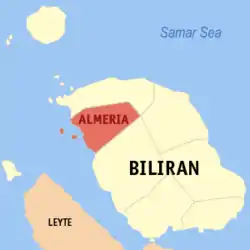Almeria, Biliran
Almeria (IPA: [ɐlme'ɾiɐ]), officially the Municipality of Almeria (Waray: Bungto han Almeria; Cebuano: Lungsod sa Almeria; Tagalog: Bayan ng Almeria), is a 5th class municipality in the province of Biliran, Philippines. According to the 2020 census, it has a population of 17,954 people.[3]
Almeria | |
|---|---|
| Municipality of Almeria | |
 Sunset at the Agta Beach Resort | |
 Flag | |
 Map of Biliran with Almeria highlighted | |
OpenStreetMap | |
.svg.png.webp) Almeria Location within the Philippines | |
| Coordinates: 11°37′14″N 124°22′46″E | |
| Country | Philippines |
| Region | Eastern Visayas |
| Province | Biliran |
| District | Lone district |
| Barangays | 13 (see Barangays) |
| Government | |
| • Type | Sangguniang Bayan |
| • Mayor | Richard C. Jaguros |
| • Vice Mayor | Marygie E. Tacoy |
| • Representative | Gerardo J. Espina Jr. |
| • Councilors | List |
| • Electorate | 12,618 voters (2022) |
| Area | |
| • Total | 57.46 km2 (22.19 sq mi) |
| Elevation | 116 m (381 ft) |
| Highest elevation | 995 m (3,264 ft) |
| Lowest elevation | 0 m (0 ft) |
| Population (2020 census)[3] | |
| • Total | 17,954 |
| • Density | 310/km2 (810/sq mi) |
| • Households | 4,519 |
| Economy | |
| • Income class | 5th municipal income class |
| • Poverty incidence | 16.78 |
| • Revenue | ₱ 85.09 million (2020) |
| • Assets | ₱ 239.4 million (2020) |
| • Expenditure | ₱ 94.87 million (2020) |
| • Liabilities | ₱ 65.21 million (2020) |
| Service provider | |
| • Electricity | Biliran Electric Cooperative (BILECO) |
| Time zone | UTC+8 (PST) |
| ZIP code | 6544 |
| PSGC | |
| IDD : area code | +63 (0)53 |
| Native languages | Cebuano |
| Website | www |
Geography
According to the Philippine Statistics Authority, the municipality has a land area of 57.46 square kilometres (22.19 sq mi) [5] constituting 10.72% of the 536.01-square-kilometre- (206.95 sq mi) total area of Biliran.
Barangays
Almeria is politically subdivided into 13 barangays.[6] Each barangay consists of puroks and some have sitios.
| PSGC | Barangay | Population | ±% p.a. | |||
|---|---|---|---|---|---|---|
| 2020[3] | 2010[7] | |||||
| 087801001 | Caucab | 10.4% | 1,859 | 1,638 | 1.27% | |
| 087801002 | Iyosan | 7.9% | 1,418 | 1,288 | 0.97% | |
| 087801003 | Jamorawon | 8.4% | 1,507 | 1,525 | −0.12% | |
| 087801004 | Lo‑ok | 6.8% | 1,226 | 1,204 | 0.18% | |
| 087801005 | Matango | 5.4% | 964 | 931 | 0.35% | |
| 087801006 | Pili | 7.1% | 1,270 | 1,252 | 0.14% | |
| 087801007 | Poblacion | 15.5% | 2,783 | 3,059 | −0.94% | |
| 087801008 | Pulang Bato | 5.4% | 971 | 949 | 0.23% | |
| 087801009 | Salangi | 5.3% | 946 | 829 | 1.33% | |
| 087801010 | Sampao | 4.1% | 735 | 726 | 0.12% | |
| 087801011 | Tabunan | 4.8% | 860 | 760 | 1.24% | |
| 087801012 | Talahid | 7.1% | 1,281 | 1,283 | −0.02% | |
| 087801013 | Tamarindo | 6.3% | 1,131 | 1,051 | 0.74% | |
| Total | 17,954 | 16,495 | 0.85% | |||
Climate
| Climate data for Almeria, Biliran | |||||||||||||
|---|---|---|---|---|---|---|---|---|---|---|---|---|---|
| Month | Jan | Feb | Mar | Apr | May | Jun | Jul | Aug | Sep | Oct | Nov | Dec | Year |
| Average high °C (°F) | 28 (82) |
29 (84) |
29 (84) |
31 (88) |
31 (88) |
30 (86) |
30 (86) |
30 (86) |
30 (86) |
29 (84) |
29 (84) |
29 (84) |
30 (85) |
| Average low °C (°F) | 22 (72) |
22 (72) |
22 (72) |
23 (73) |
24 (75) |
25 (77) |
25 (77) |
25 (77) |
25 (77) |
24 (75) |
24 (75) |
23 (73) |
24 (75) |
| Average precipitation mm (inches) | 73 (2.9) |
56 (2.2) |
75 (3.0) |
71 (2.8) |
114 (4.5) |
174 (6.9) |
172 (6.8) |
163 (6.4) |
167 (6.6) |
161 (6.3) |
158 (6.2) |
125 (4.9) |
1,509 (59.5) |
| Average rainy days | 15.2 | 12.5 | 16.2 | 17.3 | 23.9 | 27.3 | 28.4 | 26.9 | 26.9 | 27.1 | 23.8 | 19.3 | 264.8 |
| Source: Meteoblue[8] | |||||||||||||
Demographics
| Year | Pop. | ±% p.a. |
|---|---|---|
| 1903 | 4,340 | — |
| 1948 | 6,007 | +0.72% |
| 1960 | 7,553 | +1.93% |
| 1970 | 7,525 | −0.04% |
| 1975 | 9,468 | +4.71% |
| 1980 | 10,409 | +1.91% |
| 1990 | 12,013 | +1.44% |
| 1995 | 13,420 | +2.10% |
| 2000 | 13,854 | +0.68% |
| 2007 | 14,420 | +0.55% |
| 2010 | 16,495 | +5.01% |
| 2015 | 16,951 | +0.52% |
| 2020 | 17,954 | +1.14% |
| Source: Philippine Statistics Authority[9][7][10][11] | ||
In the 2020 census, Almeria had a population of 17,954.[3] The population density was 310 inhabitants per square kilometre (800/sq mi).
Economy
Government
List of mayors
- Fructosa A. Victorioso — Mayor (Appointed) 1948-1949
- Jose K. Vero — Acting Mayor 1949-1951
- Elias G. Morillo — 1952-1955
- Victorino A. Jaguros — 1956-1959
- Jose K. Vero — 1964-1967
- Victorino A. Jaguros — 1968-1971
- Victorino A. Jaguros — 1972-1977
- Florentino S. Quijano — Acting Mayor from 1978 to 1979
- Simforosa R. Jaguros — Appointed Mayor (part of 1979, part of 1980)
- Florentino S. Quijano — 1980-1986
- Jose E. Victorioso — (Officer in Charge) 1986-1987
- Florentino S. Quijano — (Officer in Charge) 1987-1988
- Supremo T. Sabitsana — 1988-1992
- Supremo T. Sabitsana — 1992-1995
- Supremo T. Sabitsana — 1995-1998
- Antonio Agajan — 1998-2001
- Rolando E. Ty — 2001
References
- Municipality of Almeria | (DILG)
- "2015 Census of Population, Report No. 3 – Population, Land Area, and Population Density" (PDF). Philippine Statistics Authority. Quezon City, Philippines. August 2016. ISSN 0117-1453. Archived (PDF) from the original on May 25, 2021. Retrieved July 16, 2021.
- Census of Population (2020). "Region VIII (Eastern Visayas)". Total Population by Province, City, Municipality and Barangay. Philippine Statistics Authority. Retrieved 8 July 2021.
- "PSA Releases the 2018 Municipal and City Level Poverty Estimates". Philippine Statistics Authority. 15 December 2021. Retrieved 22 January 2022.
- "Province: Biliran". PSGC Interactive. Quezon City, Philippines: Philippine Statistics Authority. Retrieved 12 November 2016.
- "Municipal: Almeria, Biliran". PSGC Interactive. Quezon City, Philippines: Philippine Statistics Authority. Retrieved 8 January 2016.
- Census of Population and Housing (2010). "Region VIII (Eastern Visayas)" (PDF). Total Population by Province, City, Municipality and Barangay. National Statistics Office. Retrieved 29 June 2016.
- "Almeria: Average Temperatures and Rainfall". Meteoblue. Retrieved 29 February 2020.
- Census of Population (2015). "Region VIII (Eastern Visayas)". Total Population by Province, City, Municipality and Barangay. Philippine Statistics Authority. Retrieved 20 June 2016.
- Censuses of Population (1903–2007). "Region VIII (Eastern Visayas)". Table 1. Population Enumerated in Various Censuses by Province/Highly Urbanized City: 1903 to 2007. National Statistics Office.
- "Province of Biliran". Municipality Population Data. Local Water Utilities Administration Research Division. Retrieved 17 December 2016.
- "Poverty incidence (PI):". Philippine Statistics Authority. Retrieved December 28, 2020.
- "Estimation of Local Poverty in the Philippines" (PDF). Philippine Statistics Authority. 29 November 2005.
- "2003 City and Municipal Level Poverty Estimates" (PDF). Philippine Statistics Authority. 23 March 2009.
- "City and Municipal Level Poverty Estimates; 2006 and 2009" (PDF). Philippine Statistics Authority. 3 August 2012.
- "2012 Municipal and City Level Poverty Estimates" (PDF). Philippine Statistics Authority. 31 May 2016.
- "Municipal and City Level Small Area Poverty Estimates; 2009, 2012 and 2015". Philippine Statistics Authority. 10 July 2019.
- "PSA Releases the 2018 Municipal and City Level Poverty Estimates". Philippine Statistics Authority. 15 December 2021. Retrieved 22 January 2022.